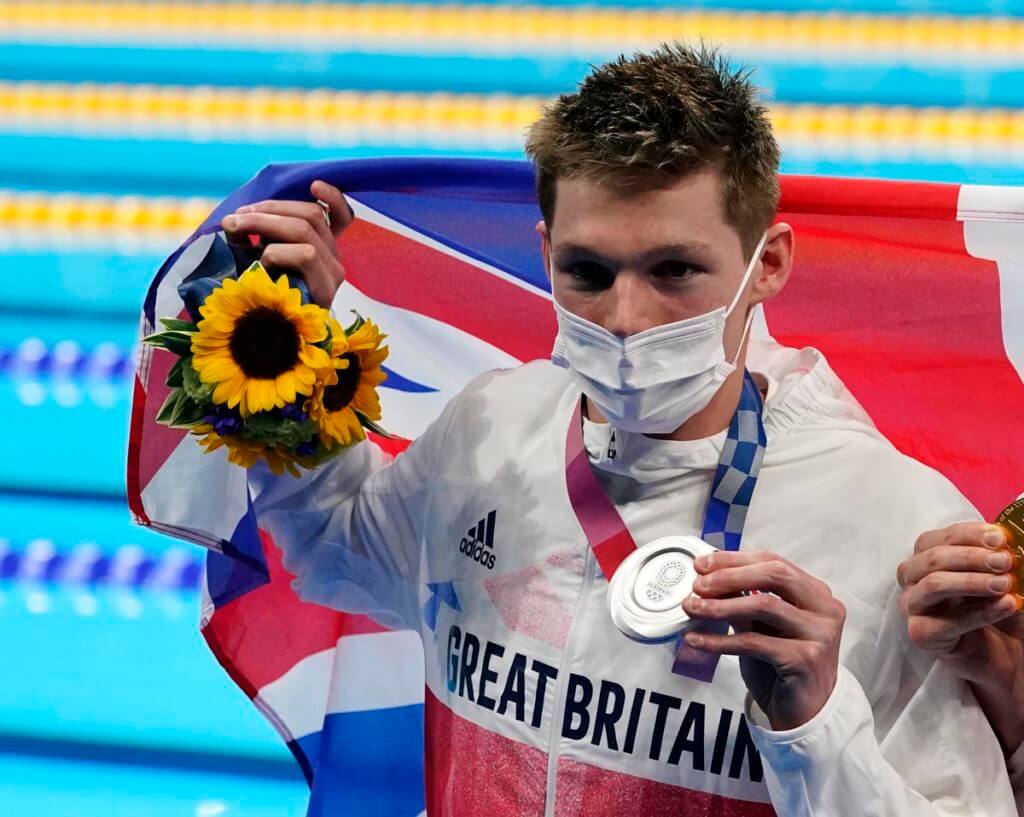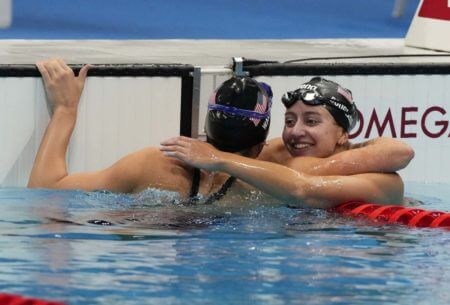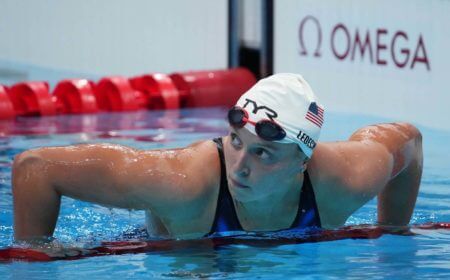Olympics Day 7 Notebook: The Underappreciated and Underrated Duncan Scott

Editorial content for the 2021 Tokyo Olympic Games coverage is sponsored by GMX7.
See full event coverage. Follow GMX7 on Instagram at @GMX7training #gmx7

Olympics Day 7 Notebook: The Underappreciated and Underrated Duncan Scott
The headline-grabbers at these Olympics will be the multi-event individual gold medalists, a list that already includes Evgeny Rylov, Ariarne Titmus and Yui Ohashi and could add Caeleb Dressel, Kaylee McKeown and Katie Ledecky before the Saturday morning finals session is over. Through a week of brilliant racing and amazing stories, however, plenty have slipped through and gone overshadowed, so here’s one: Duncan Scott is about three tenths away from being a double gold medalist.
In the men’s 200 free final, Scott looked like he was leading the field down the final 15 meters before 21-year-old British teammate Tom Dean got his hand on the wall four hundredths ahead of Scott. And then in the 200 IM, a newer event for Scott where he had never won a medal internationally, he placed second behind China’s Wang Shun in 1:55.28, crushing his previous best of 1:55.90 and improving to seventh all-time in the event. Scott also has a gold medal from Tokyo, which he won while anchoring the British men’s 800 free relay squad to a dominant gold and near-world record Wednesday morning.
Because of how the numbers work out, Scott does not figure to swim on Britain’s mixed 400 medley relay, but he will anchor the 400 medley relay, a squad capable of backing up its World Championships win from 2019 with another gold medal. Scott anchored that squad in Gwangju in 46.14 to launch himself past American anchor Nathan Adrian on the last leg – although with the British qualified second and the U.S. seventh, he won’t be able to draft off his American counterpart, likely Zach Apple, this time.
It’s tough to remember now, but Scott’s first time making ripples internationally was on day four of the Rio Olympics. He was a skinny 19-year-old when he won the last non-seeded heat of the 100 free in 48.01 to get into the semifinals, and then late that day, he qualified for his first Olympic final and swam an impressive leg on Britain’s silver-medal winning 800 free relay. Scott later finished fifth in the 100 free final and then anchored Britain to another silver in the 400 medley relay.
Now, Scott has developed to the extent where he no longer swims the 100 free at major meets now that his capabilities as an IMer have increased (and the two events conflict in the program). Scott is now on the short list of the best swimmers in the world, and while he has previously struggled at times to swim fast in World Championships finals, he has now come through with his best efforts in the most important moments at most prestigious swim meet of all.
American Success in Surprising Spots

Photo Courtesy: Rob Schumacher/USA Today Sports
The United States has won just six gold medals through six days of swimming in Tokyo, and while that group is likely to accumulate several more over the last two days, it will not come close to matching the 16 from the last two Games. But regarding total medal count, the number is already 24 and likely to reach 30. The American team has not achieved its usual high standard in certain races, so much of the success in Tokyo is thanks to performances events that had been major weak spots for the U.S. since at least the last Olympics and in some cases longer.
Take the women’s IMs, for instance. Maya DiRado won silver in the 400 IM and bronze in the 200 IM in Rio, and since DiRado’s retirement, the Americans’ only medal at either the 2017 or 2019 Worlds was a bronze from Madisyn Cox in the 200 IM in 2017. This time, while Japan’s Yui Ohashi swept both races, the Americans twice finished 2-3 with four different swimmers reaching the podium. None of that group – Emma Weyant, Hali Flickinger, Alex Walsh and Kate Douglass – had ever swum IM for the U.S. at a Worlds or Olympics before, and all but Flickinger were Olympic rookies.
Speaking of Flickinger, the U.S. women won medals in the 200 fly for the first time since the 2000 Olympics as Regan Smith got silver and Flickinger bronze. This event had been steadily trending up for the U.S. for several years, but as recently as 2017, the Americans had no World Championship finalists and their strongest swimmer in the event, Flickinger, was dealing with some health issues.
The women’s 200 breaststroke: no finalists in 2016 in Rio and no finalists at the 2019 World Championships (when Lilly King was controversially disqualified for a one-hand touch). And now, silver for King and bronze for Annie Lazor.

Bobby Finke — Photo Courtesy: Grace Hollars/USA Today Sports
And in perhaps most dramatic of all improvements, men’s freestyle has taken leaps and bounds forward in Tokyo. After Connor Jaeger retired following a 2016 Olympic silver in the 1500 free, the Americans failed to get a finalist in that event at either the 2017 or 2019 World Championships. Zane Grothe made the final in the 400 free in both 2017 and 2019 and in the 800 free in 2017, and otherwise, Americans were totally blanked in freestyle races longer than 200 meters.
But in Tokyo, the Florida-trained duo of Kieran Smith and Bobby Finke has shown some serious mettle, Smith with his bronze in the 400 free and dominant leadoff leg on the 800 free relay and Finke with an utterly stunning comeback from fourth to first on the last 50 of his 800 free. Finke will have another strong medal shot in the 1500 free final Sunday morning.
Of those six gold medals, two were from swimmers who no one in their right mind would have predicted as winners, Finke in the 800 free and Lydia Jacoby in the 100 breast. These surprising breakouts have lifted the Americans in Tokyo.
Ledecky’s Shot at History
Katie Ledecky will aim for history in the women’s 800 free final, hoping to become the just the fourth swimmer to ever win three straight gold medals in one event. The others are Australia’s Dawn Fraser (100 free, 1956-1960-1964), Hungary’s Krisztina Egerszegi (200 back, 1988-1992-1996) and Ledecky’s former U.S. teammate Michael Phelps (200 IM, 2004-2008-2012-2016, and 100 fly, 2004-2008-2012). This 800 free will mark the third individual final this week where she will race Australia’s Ariarne Titmus, but unlike in the 400 free and 200 free, Ledecky is favored this time.

Photo Courtesy: Robert Hanashiro/USA Today Sports
Ledecky has not lost an 800 free since at least 2012, the year when she stunned Britain’s Rebecca Adlington in front of an adoring hometown crowd in London to win Olympic gold. Of course, everything has changed since the then-15-year-old Ledecky shocked the world that day, but not Ledecky’s racing spirit. Remember the spirit she showed when ill at the 2019 World Championships, when she gutted her way through the 800 final and overtook Simona Quadarella to capture a fourth straight world title? Or when Ledecky was battling Titmus in the 400 free final earlier in the week or surging the U.S. forward on the anchor leg of the 800 free relay?
We all knew the 400 free would be a legendary race between Titmus and Ledecky that would be really tough for the American to win. But Ledecky is the rightful favorite in the 16-length race, and unlike when she swam to gold in the 1500 free final, she will have no other final to tire her out beforehand. In fact, Ledecky had all of Friday off, her first off-day after five straight days of competition.
Titmus will be three lanes away in lane seven, but she is likely the favorite for silver. Titmus holds the No. 2 time in the world this year at 8:15.57, and while she probably cannot keep pace during the middle section of the race, she will surely unleash her usual burst of finishing speed to run down anyone in her range.
Quadarella and 1500 free bronze medalist Sarah Kohler will also be in the mix, and 15-year-old American Katie Grimes will be the second seed after knocking three seconds off her best time in prelims – on top of the 17 seconds she dropped during her stunning breakthrough meet at Olympic Trials. Following Grimes’ career, it’s hard not to be reminded of Ledecky’s rapid rise and eventual gold medal at the same age in London. No one is predicting Grimes to beat Ledecky here, but Ledecky surely is aware of the neat parallel as she tries to clinch this spot in the history books while another young American distance ace is on the way up.




